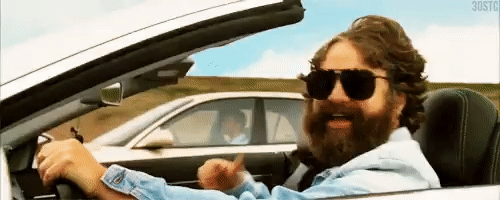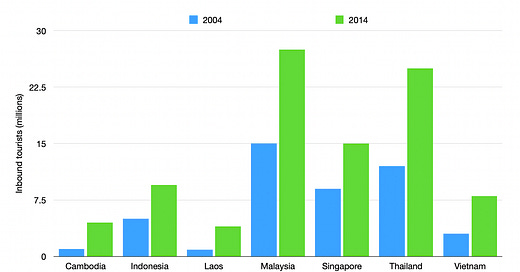Sustainability, travel writing & duty
Stuart McDonald delves into the sustainable tourism conundrum.
We’re delving into the thorny but important topic of sustainable travel this month with a series written by Stuart McDonald — founder of Travelfish.org, Couchfish on Substack, and a booming and often brutal voice of reason on travel’s biggest conundrum. Stuart is studying an MA in Responsible Tourism Management, and he’s bringing you insights from his research in all four newsletters this month.
Before we begin, though, a little PSA for you…
Fancy spending two days in Leeds meeting fellow journalists, PRs and tourist boards to pick up great new story angles for 2023 and beyond?
The second Media Getaway will be taking place this June in Leeds and will give you the opportunity to meet and network with PR representatives of some of the biggest travel brands and destinations.
I (Lottie) attended the inaugural event in Manchester in 2022 and not only came away with some brilliant ideas to pitch, but I also got to fulfil my dream of serenading a room of strangers with my best rendition of Tiny Dancer (yes, there was karaoke — optional, of course). In all seriousness, though, it’s an event not to be missed and helps get anyone stuck in that London bubble out to meet new faces. Accommodation and meals are covered, too, so you just need to get yourselves there.
Further information about the event, and how to sign up can be found here.
We The Influencers
My name is Stuart McDonald, I’m a travel writer, and I’ve been travelling in circles in Southeast Asia since 1993. Like many in the trade, I fell into the travel writing business and made it up along the way. I’ve co-authored guidebooks, freelanced and run an online travel guide called Travelfish.org.
Thanks to the pandemic, Travelfish fell asleep and I launched a newsletter, Couchfish. It’s a mix of paid-for and free-to-read material, the former an itinerary (which you can see mapped out here), the latter, everything else. As the pandemic wore on, I found myself writing more and more about the woes of tourism.
You see, we launched Travelfish in 2004 and rode the wave of late 1990s travel, but the wave grew into a behemoth. Consider for a moment, growth in inbound tourism to some of Southeast Asia over our first ten years:
Those are some pretty heady increases. Over the same period, Thailand’s supply of islands didn’t grow and popular spots groaned with crowds. Coined as overtourism (see here for a good piece on why you should stop using that term), many popular spots became posterchilds for the worst excesses of tourism. I’d grown concerned about tourism’s ravages after our first decade, but it took the pandemic to cement my view. Living in a tourism hotspot, it was only when the slow boiling stopped, that as my home reverted to what it once was, I realised what it had really become.
To get a handle on things, I went back to school, to a Masters in Responsible Tourism Management at Leeds Beckett. It was there that I began to grasp what tourism could be—as opposed to what it was.
I live in Bali, Indonesia—no doubt you’ve heard of it. An island that has gained much through tourism, it is also one that has suffered immeasurably. From over a decade ago, this story sums up some of the key problems that have only worsened with time. I thought the pandemic would lead to a rethinking of tourism to Bali, but that was just another of my fever dreams. It is clear, for all to see, that much of the industry can’t get back to 2019 fast enough. Have we learned nothing?
Speaking for myself, I learned plenty—plenty enough to change my own behaviour. The first steps came easy. A refillable water bottle, no single-use plastic, the train rather than the plane, and yes, bamboo straws. But the more I read and learned, the more I understood these steps were the lowest of the low hanging fruit. I knew I had to broaden my efforts.
I looked at what I’d been writing for the last 18 years. When we’d started Travelfish, we worked to highlight small, family-run businesses. Focused on backpackers, we didn’t touch a horizon pool or luxury joint for years. Over time though, we strayed. Tempted by fat hotel affiliate commissions, we broadened our coverage. The bones remained solid, but there is plenty of flesh that today no longer belongs. As travel picked up, instead of writing new material, I’ve been re-writing—or just deleting. Reams wait for reappraisal as I settle in on this new tack, to focus on a more sustainable form of tourism. But what exactly is that?
I doubt whoever coined “unnecessary complexity breeds job security,” had tourism in mind, but it fits. There’s a glad bag of terminology and concepts, and an army of consultants on hand to charge you to understand. Sustainable tourism, responsible travel, purposeful travel, mindful travel, regenerative travel, the list is ... endless. But what does it all mean? As Lottie and Steph haven’t given me eight million words, I’ll settle for a quick glance over the two most central terms.
Sustainable tourism, in the words of tourism academic Richard W Butler is:
“... tourism which is developed and maintained in an area (community, environment) in such a manner and at such a scale that it remains viable over an infinite period and does not degrade or alter the environment (human and physical) in which it exists to such a degree that it prohibits the successful development and well being of other activities and processes.”
If you think that’s nebulous—and a very long freakin’ sentence—you’ll love responsible travel. As with the above, the phrase has its roots in tourism academia, this time with Harold Goodwin. It is a harder one to boil down, but it revolves around seven precepts. In essence, it recognises the damage tourism is capable of and considers two challenges: How to minimise the bad, and maximise the good.
Both phrases are open to interpretation with not a concise target in sight. They’re designed in this way because tourism isn’t a one-size-fits-all affair. What might work in Latvia or Liechtenstein might not in Laos or Liberia. There’s plenty of overlap between the two, and as with most tourism terms, they’re misapplied more often than not. Think “boutique hotel” only far far worse.
Nevertheless, the principles are straightforward. In both, the pillars of tourism’s impact centre on three aspects. The social, the environmental, and the economic. There’s no prescribed order and they often conflict. A new resort might ravage the environment but provide loads of local jobs. A hill tribe trek might bring money to a village but disrupt social norms. A new airport might bring in tourists but pollute a pristine environment. The eternal question, “How do we maximise the good and minimise the bad?” needs asking not only on the behalf of the tourists, but of the residents in the destination as well.
Seeing these issues surfaced in travel writing, particularly service writing, is rare. Tradition holds that the travel writers’ first duty is to the reader—to help them get more out of their travels. By putting sustainable tourism at the forefront of your writing, you’ll still be able to do that, but you’ll better serve those in the destination as well.
Next week, a look at the implicit double standard—how can someone who flies around the planet to write about travel preach about sustainable tourism with a straight face.
Tweet of the week

Who to follow


Industry must-reads
This clever, immserive piece by Hakai Magazine is an utterly damning take on the cruise industry in Alaska — completely bleak reading done very well.
In better news, the “flying bum” is a very exciting prospect for hybrid-powered travel.
Finally, delve into some of Stuart’s original writings on sustainability on Couchfish — here are 10 to get your started:
National Chocolate Milk Day (World Tourism Day)
Nice Tourism (Sustainable Tourism)
The Benevolent Lie (Responsible Tourism)
The Year Is 2006. The Town Is Luang Prabang (Pro-poor Tourism)
Zoom in to the Red Plastic Chairs (Slow Travel)
The Petro-bourgeoisie (Flying, carbon etcetera)
Reality Check (Tour companies)
Follow the Money (Money matters)
Foundations Matter (Community Based Tourism)
Reframing & Reshaping (The Travel Foundation Report)






Excellent read and resources here. As always, thank you
Excellent article. Can't wait to read the next one.
I'm currently pitching a story around about how one of SEA's most visited floating markets is falling apart, largely due to tourism, and why you probably shouldn't visit. But it seems to me most publications are not interested in publishing anything that isn't glowy descriptions of places to entice tourists to flock there. This, no doubt, is a huge part of the problems with tourism today.